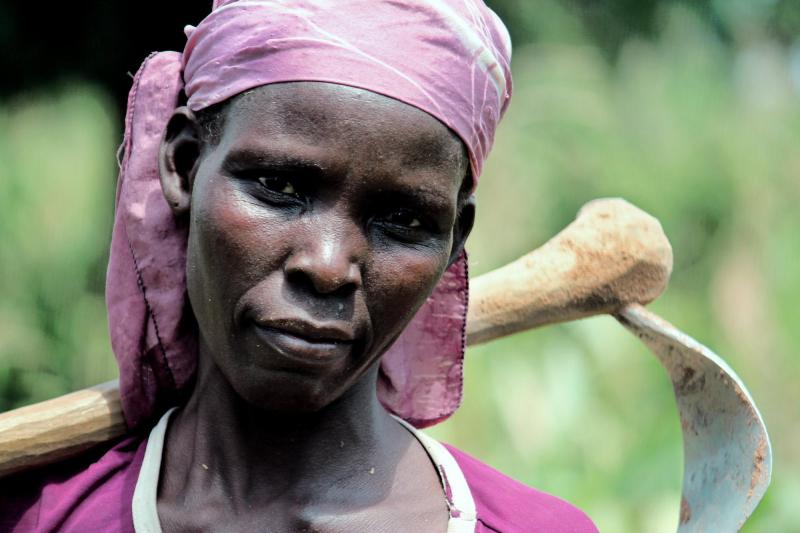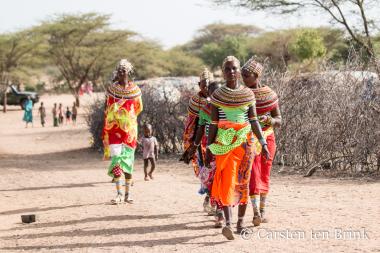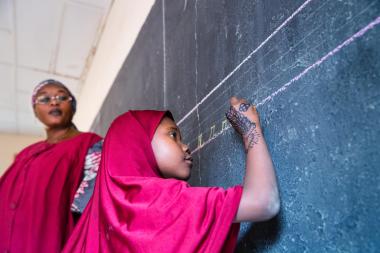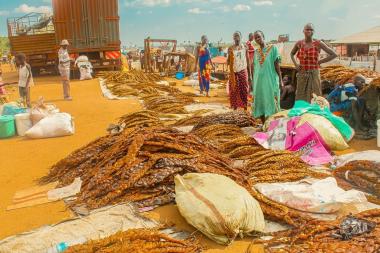News
“If knowledge is power, then sharing knowledge is sharing power.”
SPARC launches new partnership working with women and girls from dryland communities in the Sahel to build more resilient, equitable livelihoods.
Publisher SPARC
Researchers, practitioners and funders will meet next week to launch a new SPARC partnership working with women and girls from pastoralist and agropastoralist communities in the Sahel to build more resilient and equitable livelihoods.
Experts from SPARC will join colleagues from the International Development Research Centre (IDRC) and three Non-Governmental Organisations at a workshop in Nairobi, Kenya, from June 21 to 23 to launch the three-year partnership.
SPARC will collaborate with three in-country partners working in Nigeria and South Sudan - the Centre for Population and Environmental Development (CPED) - a non-governmental organisation that aims to use policy-oriented research and engagement to promote sustainable development, and reduce poverty and inequality in Nigeria, Fulbe Development and Cultural Organization (FUDECO) - a community-based participatory action research network that seeks to protect pastoralists’ livelihoods in Nigeria and Kenyatta University, which supports researchers to produce and target knowledge to diverse stakeholders, including civil society, policymakers and practitioners.
During the three-day workshop, representatives from each organisation will present their work plans and research ideas, and collaborate with colleagues from SPARC and IDRC to share, review and refine planned research activities.
The project is part of the 'Advancing Gender Equality in Fragile Food Systems in the Sahel', an initiative made possible by IDRC funding of approximately CAD 1.97 million. It aims to empower women in fragile environments, and support researchers to carry out gender-responsive research and policymakers to better integrate gender equality into policy.
Sarli Nana, Principal Investigator and Team Lead from FUDECO, said the partnership will support participatory action research, including training pastoralist women and men to carry out research, the translation of research materials into the Fulfulde language, the evaluation and scaling of current projects in several regions and setting up new pilot projects.
“If knowledge is power, then sharing knowledge is sharing power. Pastoralists are marginalised and our women suffer multiple layers of inequalities. This new partnership with SPARC is very important because, for the first-time, pastoralist women in Nigeria are going to be telling their own stories, identifying their issues, and working out solutions for them – filling a huge gap…
"The access [to pastoralism] and authentic research will contribute towards changes in gender equality policies and practices at the local, national, and regional levels."
"The access [to pastoralism] and authentic research will contribute towards changes in gender equality policies and practices at the local, national, and regional levels."
Sarli Nana, Principal Investigator and Team Lead from FUDECO.
Dr Andrew G. Onokerhoraye, Chief Executive at CPED, welcomed the new action research partnership and the shared ambition to build the capacity of researchers and work with women and girls in the Sahel to generate knowledge, and shape policy and practice.
He added that the funding would be used to support four major research activities in Nigeria’s Sahel region in Bauchi and Gombe States. These will include building the capacity of women leaders to promote gender equality in pastoralist communities and training policymakers to better integrate gender equality and women’s empowerment initiatives in public policies and programmes.
“Even though CPED has collaborated with many international and donor agencies in the implementation of its various programmes, the new partnership with SPARC is important and indeed unique…
“The attention being paid by SPARC to the challenges of development in the Sahel region is of major interest to CPED. While some research has been carried out in the Sahel region including the Nigerian component, most of these tend to focus on environmental conditions and security issues with less attention focused on the socio-economic conditions of the vulnerable and marginalised groups including - of course - women. SPARC’s attention on the Sahel region is commendable and CPED will benefit from its partnership with SPARC.”
“The attention being paid by SPARC to the challenges of development in the Sahel region is of major interest to CPED. While some research has been carried out in the Sahel region including the Nigerian component, most of these tend to focus on environmental conditions and security issues with less attention focused on the socio-economic conditions of the vulnerable and marginalised groups including - of course - women. SPARC’s attention on the Sahel region is commendable and CPED will benefit from its partnership with SPARC.”
Dr Andrew G. Onokerhoraye, Chief Executive at CPED.
Professor Joy Obando, Principal Investigator at Building Gender Responsive Climate Resilient Communities in South Sudan (GECRESS) at Kenyatta University, said their work will include working with women and girls, and men and boys, from the Dinka of Jonglei in South Sudan. Policymakers will also be involved from the outset - early participation that she believes is key to improve policies for gender and social inclusion in pastoralist and agropastoralist regions.
The project will also support South Sudanese Masters students to carry out research on issues related to the project research themes, and will build the capacity of people from dryland communities where the field work will take place to share research findings in local languages.
“The new partnership with SPARC is important in terms of new knowledge to empower women and girls in the context of a changing climate, conflict and fragility...
"The research findings will be shared with communities and other stakeholders... It is anticipated that the policy makers would use the findings to improve their planning and programming around pastoral societies in South Sudan.”
"The research findings will be shared with communities and other stakeholders... It is anticipated that the policy makers would use the findings to improve their planning and programming around pastoral societies in South Sudan.”
Professor Joy Obando, Principal Investigator at Building Gender Responsive Climate Resilient Communities in South Sudan (GECRESS) at Kenyatta University.
Find out more about SPARC’s partnership with IDRC here.
Don’t miss Katharine Vincent, SPARC Gender Equality and Social Inclusion (GESI) Lead, on the programme’s vision to foster inclusivity and equality in research into, and funding and practice of, resilience building in drylands affected by fragility and climate.
Watch this video where the SPARC-IDRC Gender Equity and Social Inclusion team discuss how they're working with pastoralist women and communities, and policymakers, in Nigeria and South Sudan to ensure that research leads to action:

Asabey John in Borno State, Nigeria
Credit Image by Conflict & Development at Texas A&M University - CC BY-NC-ND 2.0


